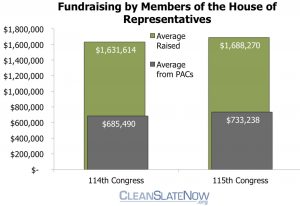Reliance on PAC Money Grows among Representatives, but So Does The Number Abstaining
- At December 21, 2016
- By MarkMehringer
- In Research
 0
0
The latest campaign reports from the 2016 Election are now in, so we took a look at the reports for the incoming 115th Congress – focusing on the House of Representatives. That’s where special interest groups and their political action committees (PACs) have the greatest influence.
Click here to see the list of every Representative in the 115th Congress, how much they raised through the election, and how much of that came from PACs.
Overall, there are three key changes from the 114th Congress to the 115th:
- In the 115th Congress, 6 Representatives (4 Democrats and 2 Republicans) won office without taking any PAC money. In the 114th Congress, there were only 4 Representatives who won without PAC money (3 Democrats and 1 Republican).
- Overall fundraising has increased. So far, the average Representative raised $1.688 million dollars. That’s up from $1.631 million for the 114th Congress – and the total for the 115th Congress does not include any money raised in December, when PACs and special interest tend to lavish members with money before their first votes.

- Despite the jump in the number of Representatives swearing off all PAC money, the average incoming Representative now relies even more on PAC money than they did coming into the 114th Congress. This election cycle, the average Representative received 48% of their campaign funds from special interest PACs, up from 47% in the last Congress. That number might climb even further once the final reports come in at the end of January.
If you find value in this information and would like to support Clean Slate Now, please become a member with a recurring $5 monthly contribution. With your support, we will be able to continue our efforts to reform our political system.
Also, if you’d like to know which PACs are giving to your elected officials, click here to become a monthly member and we will send you regular reports about your own elected officials.
-Mark Mehringer
